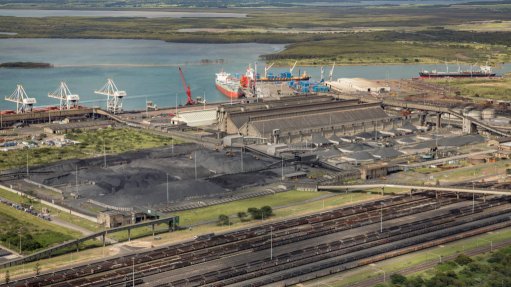Local steel industry in prime ‘springboard’ position
Despite contributing only a small percentage to global steel production, the South African steel sector supplies critical components to the global economy, says industry body Southern African Institute of Steel Construction (Saisc) CEO Amanuel Gebremeskel.
He argues that the local steel sector can deliver critical projects in a timely manner while being less vulnerable to geopolitical conflicts, thereby ensuring that shipping times and product quality remain uncompromised.
While South Africa can deliver on high-quality products, skills and an optimal value chain position, the country is also “conveniently located” in a “powerful springboard position.”
“The combined benefit of proximity and capability gives the local steel industry an outsized effect on regional projects despite only producing small volumes of steel,” says Gebremeskel, adding that there are opportunities for export to other African countries as regional trade treaties come into force.
Moreover, he contends that Saisc members and the broader local economy can also remain competitive by helping to set quality and industry standards that can be applied across Africa.
Players in the local sector are, therefore, encouraged to support and sponsor the Saisc’s quality and standards initiatives.
“We need local steel manufacturers to back us, as we target specific markets and products, which include sponsoring international trade delegations and visits to our sister steel institutes and steel conferences. We also need support from local manufacturers as we draft common steel specifications and codes,” says Gebremeskel.
He adds that the Saisc also requires assistance regarding its education and training initiatives at local and pan-African universities, noting that education and training – as well as research – ensure the future sustainability of the local steel industry.
“If we get it right, we can change the outlook and prospects of the South African steel industry for the better.”
Gebremeskel also identifies the local mining and renewable-energy sectors as key growth areas for the local steel industry, as it has established good capacity to supply the infrastructure required for renewable-energy independent power producers.
Self-Sufficiency
Gebremeskel notes that the South African steel industry has managed to become localised and self-sufficient to a degree that insulates the sector from global geopolitical uncertainties.
While being more integrated into the supply chain does bring about benefits, such as lower prices, South Africa’s local steel mills, erectors, project managers and fabricators give the industry a strategic advantage.
“Our steel industry is not only about fabrication and erection. South Africa also produces its own steel and, in a way, this protects the projects that our local sector supplies, as they aren’t affected by global supply chain problems, such as those caused by the war in Ukraine,” he assures.
Moreover, the strain placed on global supply chains, owing to the ongoing war in Ukraine and other geopolitical uncertainties, creates an opportunity for South Africa to serve as the hub for infrastructure development projects in Africa.
He reiterates that, while market demand is muted in South Africa, as capacity constraints have prevented government from rolling out many of the large infrastructure projects envisaged in its National Development Programme, the local steel industry can find a greater market in the rest of Africa through exports.
“The needs in Africa are greater than in any other region of the world, and there are opportunities in power and water infrastructure, roads, bridges, housing and urban development. The question remains how to fund it,” he says.
Consequently, government has a key role to play in the steel sector’s future, not least in supporting steel companies as they target exports into Africa, including through measures and frameworks which mitigate against political and other risks, Gebremeskel concludes.
Article Enquiry
Email Article
Save Article
Feedback
To advertise email advertising@creamermedia.co.za or click here
Announcements
What's On
Subscribe to improve your user experience...
Option 1 (equivalent of R125 a month):
Receive a weekly copy of Creamer Media's Engineering News & Mining Weekly magazine
(print copy for those in South Africa and e-magazine for those outside of South Africa)
Receive daily email newsletters
Access to full search results
Access archive of magazine back copies
Access to Projects in Progress
Access to ONE Research Report of your choice in PDF format
Option 2 (equivalent of R375 a month):
All benefits from Option 1
PLUS
Access to Creamer Media's Research Channel Africa for ALL Research Reports, in PDF format, on various industrial and mining sectors
including Electricity; Water; Energy Transition; Hydrogen; Roads, Rail and Ports; Coal; Gold; Platinum; Battery Metals; etc.
Already a subscriber?
Forgotten your password?
Receive weekly copy of Creamer Media's Engineering News & Mining Weekly magazine (print copy for those in South Africa and e-magazine for those outside of South Africa)
➕
Recieve daily email newsletters
➕
Access to full search results
➕
Access archive of magazine back copies
➕
Access to Projects in Progress
➕
Access to ONE Research Report of your choice in PDF format
RESEARCH CHANNEL AFRICA
R4500 (equivalent of R375 a month)
SUBSCRIBEAll benefits from Option 1
➕
Access to Creamer Media's Research Channel Africa for ALL Research Reports on various industrial and mining sectors, in PDF format, including on:
Electricity
➕
Water
➕
Energy Transition
➕
Hydrogen
➕
Roads, Rail and Ports
➕
Coal
➕
Gold
➕
Platinum
➕
Battery Metals
➕
etc.
Receive all benefits from Option 1 or Option 2 delivered to numerous people at your company
➕
Multiple User names and Passwords for simultaneous log-ins
➕
Intranet integration access to all in your organisation


















